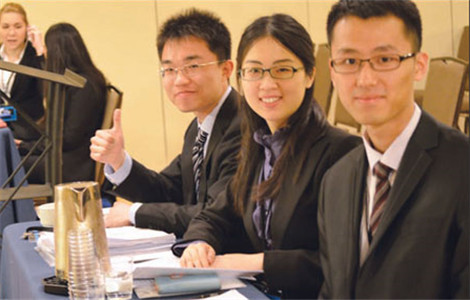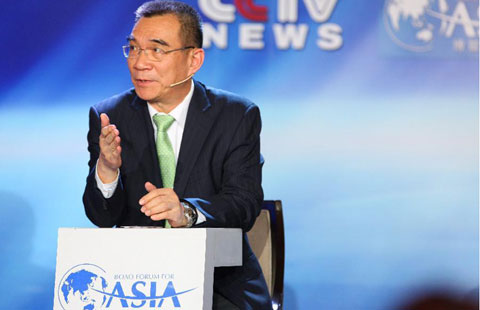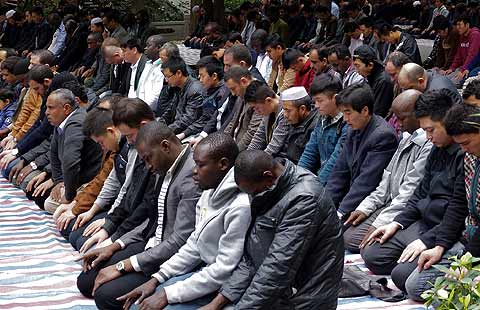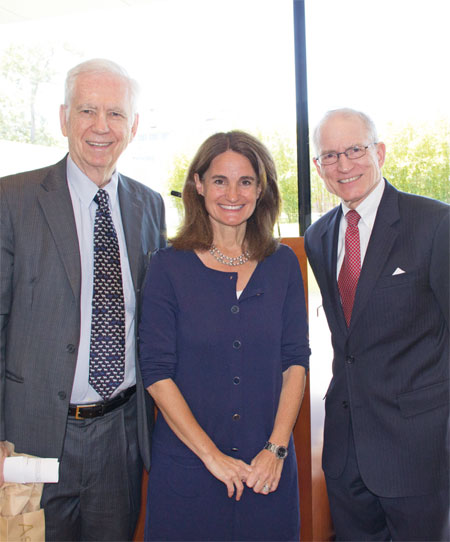China's mixed stories in quest for resources
Updated: 2014-04-09 11:29
By May Zhou in Houston (China Daily USA)
|
||||||||
China's quest for resources in the world is not a single story but mixed stories, author Elizabeth Economy told an audience at the Asia Society Texas Center.
As part of Asia Society's Authors and Asia program, Economy -the C.V. Starr senior fellow and director for Asia studies at the Council on Foreign Relations in New York - was invited to speak to local business and community leaders about her newly published book, By All Means Necessary: How China's Resource Quest is Changing the World, co-authored with Michael Levi.
Citing policy changes made in Brazil and many other countries, Economy on Tuesday illustrated how China's quest for resources is affecting the world.
"Every shift in China's economy will have profound impact on China's resource quest and we have to look at all the complicated factors to all of that. We need to keep abreast of what's changing in China," Economy said.
To better understand China's resources issue, she and Levi did extensive research to see what is really going on. Economy said the results were surprising - even to herself. She said writing the book helped her to debunk some major myths surrounding China's resources quest, including that it is neither unprecedented nor unique.
While China's search for resources went back as far as Ming Dynasty, "every rising power in history had gone out in search of resources, for example, the United States went out to look for rubber at one point, Japan in the 1970s and 1980s went out to look for a wide variety of commodities."
Another myth is that China has unfair advantages for resources because it is a well-orchestrated effort at the central government level with low cost financing and cheap labor.
Again this is not entirely true, Economy said, because a lot of China's state-owned companies are more interested in becoming world-class companies against other multinational companies when they go out to invest overseas. When those companies realized they would lose a lot of money, they did not necessarily follow the plans and directions laid out by the government.
Using China's mining industry as example, Economy said that only one-third of them are state-owned, which she said another contrary factor to the assumption of a concerted effort at the central level.
Economy said prior to writing the book, at the first glance her image of China was "as the cookie monster of the resource world, gobbling up resources everywhere it looked". But closer examination suggested otherwise, she said.
Economy cited as an example the land investment overseas, where China ranked third behind Canada and the US. Also, a big disparity has existed between announced deals and realized investments, she said.
"Size does matter," Economy said. With 1.3 billion people, 20 percent of the total population in the world, Economy thinks it is not unreasonable that China is consuming 11 percent of global oil or 27 percent of soy beans. In contrast, Japan was consuming 10 percent of global oil in the 1970s with a much smaller ration of world population, she explained.
mayzhou@chinadailyusa.com
|
Former US Ambassador (to Qatar) Chase Untermeyer (right) and Asia Society Texas Center Chairman Charles Foster (left) poses with Elizabeth Economy after the speech. May Zhou / China Daily |
(China Daily USA 04/09/2014 page2)

 Mummy & me in New Zealand
Mummy & me in New Zealand
 Chinese schools vie in moot court
Chinese schools vie in moot court
 Australian divers start underwater search for MH370
Australian divers start underwater search for MH370
 Cleaver-wielding man subdued after tense standoff
Cleaver-wielding man subdued after tense standoff
 Pro-Russian demonstrators announce Kharkov's independence
Pro-Russian demonstrators announce Kharkov's independence
 Breakdancer 'freezes' in front of Paris landmarks
Breakdancer 'freezes' in front of Paris landmarks
 TV Debate in Boao Forum for Asia Annual Conference
TV Debate in Boao Forum for Asia Annual Conference
 Ming Dynasty 'chicken cup' sells for record $36 million
Ming Dynasty 'chicken cup' sells for record $36 million
Most Viewed
Editor's Picks

|

|

|

|

|

|
Today's Top News
Rwandans told 'never again'
Kim Jong Un reelected first chairman of NDC
Blast kills 23 in market on edge of Pakistani capital
Cross-border deals headed south?
Two more 'pings' detected in search for MH370
China urges US to restrain Japan
Moscow warns Kiev of 'civil war'
Asia Society launches think tank
US Weekly

|

|








